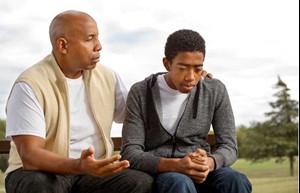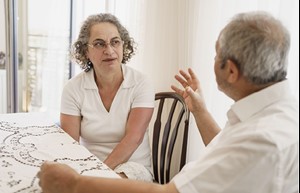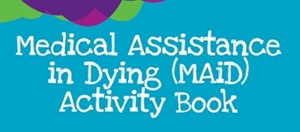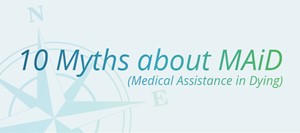Planning for the time left
“I just feel I have taken care of one more thing – it has brought me a strange sense of peace.”
“When I knew the date, I felt paralyzed, like a deer caught in the headlights. What was there to say? What was important enough to talk about? What would be helpful for him? Silences felt awkward, and I felt the panic of time slipping away.”
“When we knew the date, we knew exactly what we wanted to do and how we wanted to spend our time together. As hard as it was, the certainty of the day made it crystal clear where we wanted to put our energy.”
You may feel yourself watching the clock and anticipating the date and time. This can come with many contradictory feelings including being at peace, fear, loss, anger, sadness, relief, and even elation. You may feel ready to die, or you may not. Whatever your emotions, it can be important to share your feelings with someone you trust who can give you support.
When you think about how you might use the time you have left, you may want to focus on the people and activities that are most important to you.
You might ask yourself:
- What do I most want to do (practical tasks, outings, projects, things that bring me meaning and enjoyment)?
- Do I want to spend this time alone or with others? and or a combination?
- Are there special people that I want to spend time with?
- Do I want other visitors?
- Is there a favourite movie I would like to watch, read a favourite book, or listen to certain music?
- What is important to say or say again to the people I care about? How would I like to say goodbye?
- Do I have memories or stories I want to share with the important people in my life (highlights, achievements, regrets)?
- Are there things I want to write down for others or record for them? Is there anyone I would like to ask to help me with this?
- Are there things I want t to give to others while I am still alive?
- Does my family know which funeral home to use? Do they know my wishes about cremation or burial? Do they know what I want for a funeral, memorial, or celebration of life? Do I want to be involved in writing my obituary?
- Who do I want to be present at my death? What do I want that day to look like?
- What do I need and want help with, and who might help me?
Thinking about these things can help focus your time and energy on what matters the most to you.
Try not to postpone difficult decisions or conversations. Talking about hard things can help resolve anxiety and may contribute to your peace of mind. Speak to your health care provider or the MAiD team if you have questions or concerns or would like help talking to your family and friends.
You may find you have times of great love and connection, mixed in with overwhelming grief and sadness. Take time to rest. Try to be as kind, gentle and patient with yourself and others as you can.
Read more
Often, when others know that your death is near, they will want to visit and say their goodbyes. Sometimes you and your family may welcome the support and company of others. Other times you may feel like this is a burden and that it drains your energy and creates additional stress for you and others to manage visitors.
You and your family need to be aware of your limits. You may want to ask people to limit visits to 10 or 15 minutes. It is also okay to let people know that you are too unwell for visits. This may be upsetting to some but try to help them understand this is not a reflection on the closeness of the relationship, but rather on your stamina and health. You or your family might suggest they write a letter or make a video or audio recording instead.
“Mom set the date 4 weeks before she died. I took on the role of gatekeeper - managing the many people who wanted to have last visits and sharing the news. I felt like the ‘Grim Reaper of bad news.’ I also felt the burden of consoling people. At times I was angry and frustrated with those whose visit was made into a ‘grand gesture’. This only added to the mix of feelings, and it took my energy. It was an intense and somewhat confusing time. The positive piece was that when you plan your death, you get to hear all the nice things.”
In some cases, the time of diagnosis to assisted death can be a few short weeks or less. You may feel like you haven’t caught up emotionally from the first news of the diagnosis and now there is a date for MAiD– and it all just feels “too fast”. It can feel difficult to adjust and accept what is happening.
“It gave me the chance to be completely present with my mum. When you don’t know when a critically ill loved one is going to die, you hold a bit of yourself back, so you have more to give the following day. But we knew exactly how much time she had left.”
During this “in between time”, you may have similar feelings and responses as the person who is having MAiD. You may also be “clock watching” and counting down the days on the calendar. You may be acutely aware of time in a way you haven’t been before.
Your thoughts and feelings will also depend on whether or not you are in agreement with their decision to have MAiD. Even if you support their right to make decisions for themselves, you may not support the idea of a medically assisted death.
Either way, these will be your last days or weeks with the person you care about. Now is the time for the path of least regret. Take time to tell the person what they have meant to you, what you have learned from them, what you will always remember about them. We cannot hear too many times that we are loved, cared about, and will be remembered.
Dr. Ira Byock, a renowned expert in palliative care, dying and grief has written that there are four things in relationships that “matter most”. He suggests that all of us, whether we are dying or not, have meaningful conversations with each other that say “Please forgive me,” “I forgive you,” “Thank you,” and “I love you.”[1] He encourages us to “state the obvious” rather than assuming that the people that we love and care about know that we love them (and forgive them).
It is hard to say goodbye, but it can be important to acknowledge that this is what is happening – you are saying goodbye to one another.
Every family and every relationship is different. You may be someone who has always said what you think or feel, or maybe you have rarely talked about your feelings. You may be in a family where there is almost an “unwritten rule” that you don’t talk about death or about feelings.
Resources
You might find it helpful to look at resources that have been developed to help people talk about death and dying, although they are not specific to an assisted death. Here are two from the Canadian Virtual Hospice website:
- Tips for Talking with Someone Who is Dying - Canadian Virtual Hospice
- What Do I Say? - Canadian Virtual Hospice
[1] Byock, Ira, The Four Things That Matter Most, Simon and Schuster, 2014. ISBN 978-1-4767-4853-5
Videos
More Articles

What is MAiD?

The application process for MAiD

Why do people consider MAiD?

Telling family and friends

Talking to children and youth about MAiD

Starting a conversation about MAiD with the person who is ill

Seeking information and starting the process

Capacity and consent and why they are important

Having the assessments

Choosing when and where

Planning the day of MAiD

A medically assisted death

Grief after a medically assisted death

For healthcare providers
Featured Content

Understanding MAiD for individuals and families
Read More
MAiD Activity Book for Kids
Read More
Understanding MAiD for healthcare providers
Read More
Infographic - Q&A about MAiD
Read More
MyGrief.ca Module - Grief and Medical Assistance in Dying (MAiD)
Read More


